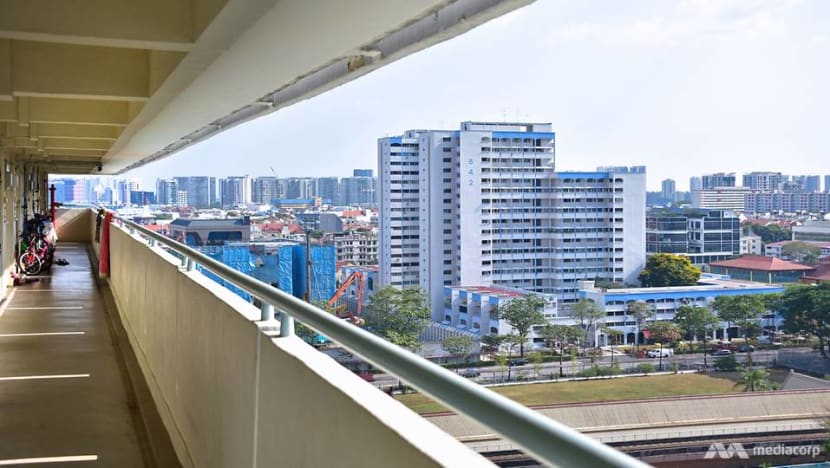Does your chair-dragging at home disturb your neighbours? You can find out soon
The Municipal Services Office is also studying a recommendation to extend the quiet hours to 10pm to 8am, from the current 10.30pm to 7am.

View of HDB blocks, seen from the corridor of another block. (File photo: Gaya Chandramohan)
SINGAPORE: If you’ve ever wondered how much noise your daily activities cause to your neighbours, you can experience it for yourself soon – at an experiential space set up by the Municipal Services Office (MSO).
“The experiential space will allow visitors to test first-hand how different actions create different decibel levels of noise, and to challenge their perception on the direction of the noise,” said Senior Minister of State for National Development Sim Ann during the Committee of Supply debate on Thursday (Mar 2).
Ms Sim said that the feedback provider who suffers from noise can only describe its effect, and often after the fact.
"Without the neighbour’s cooperation, it is hard to find out for sure whether and how the neighbour has caused the noise," she said.
This may sometimes lead to speculation from residents during noise-related disputes, said an MSO spokesperson.
MSO will also look to educate visitors on actions that can be taken to reduce the noise impact on neighbours. It said it is unable to provide examples of the types of noise that visitors can experience as it is still planning the space.
The experiential space is expected to open to the public in the second half of this year.
The idea came from a visit by the Community Advisory Panel on Neighbourhood Noise to a research facility in South Korea, where there was a dedicated space for visitors to understand various kinds of inter-floor noises.
The advisory panel was set up in April last year to define what is deemed as acceptable and unacceptable noises and noise thresholds, as well as what constitutes good community norms to reduce noise disturbances.
In particular, it looked at noise from neighbours and congregational noise in common areas. The panel submitted its recommendations to the Government in November 2022, following engagement with the community to gather public views and suggestions.
On Feb 27, Second Minister for Law Edwin Tong said that disputing neighbours in some cases, such as those involving noise, will be required to go for mandatory mediation, with penalties imposed on them if they fail to show up, as part of the Ministry of Law's efforts to improve the take-up of mediation among disputing neighbours at an early stage.
Mr Tong said that disputes related to noise make up the vast majority of neighbourly disputes.
Among the types of neighbourhood disputes which peaked in tandem with COVID-19 stay-at-home restrictions, inter-unit neighbourhood noise continues to be a cause for concern among residents, and the amount of feedback on this topic is still above pre-pandemic levels, said MSO.
Yet incidents of noise nuisance often go unchecked due to their "transient and subjective nature", until the situation sometimes boils over and relations between neighbours break down, it said.
Ms Sim announced that MSO will pilot a unit of dedicated personnel, who will leverage stronger laws, and actively work with affected parties to deal with serious cases that are beyond self-help.
“Often there are signs that at least one of the conflicting parties purposely
weaponise noise to cause suffering to their neighbours over a prolonged period. We think this is wrong and that strong actions are needed to put a stop to this,” she said.
MSO said it has been working with relevant agencies and community partners to promote community norms, such as encouraging residents to be considerate and to try to resolve issues amicably among themselves.
For example, a group of residents in Pioneer are testing the use of physical calendars at lift lobbies, which they will use to inform neighbours in advance about their plans for noisy home-based activities, such as renovations and gatherings.
MSO is currently studying the advisory panel’s recommendation to extend quiet hours from the current 10.30pm to 7am, to 10pm to 8am, adding that some community events already end by 10pm. It will engage members of the public and relevant stakeholders to hear their views on the possible impact of this proposed extension.
It is also studying the panel’s recommendation for a noise threshold in the form of a decibel limit to assess egregious cases of neighbourhood noise, to assess how it would help in the management of noise issues.
"To be meaningful, the decibel limit should cater to residential settings and not industrial or construction settings," Ms Sim said.

















